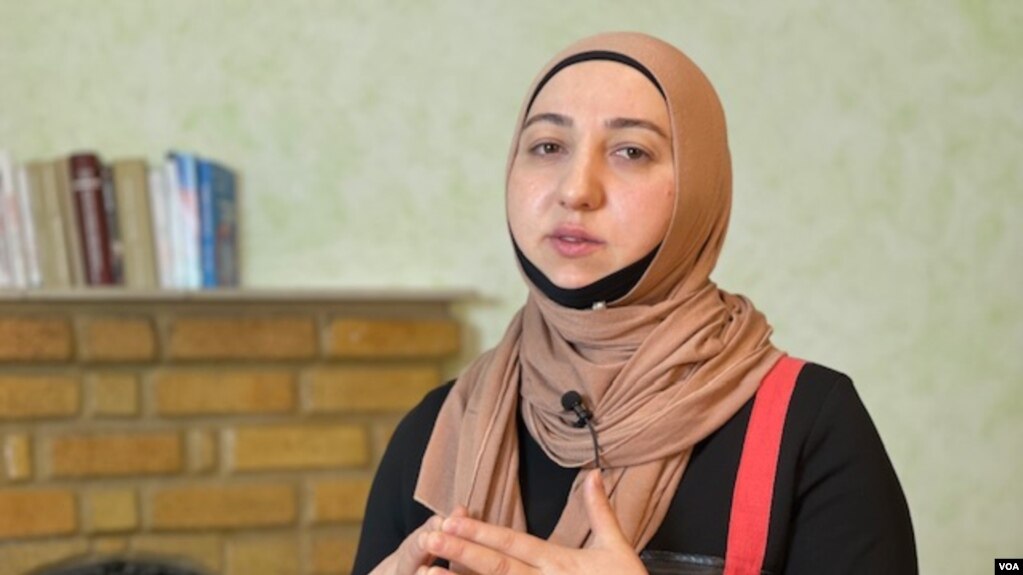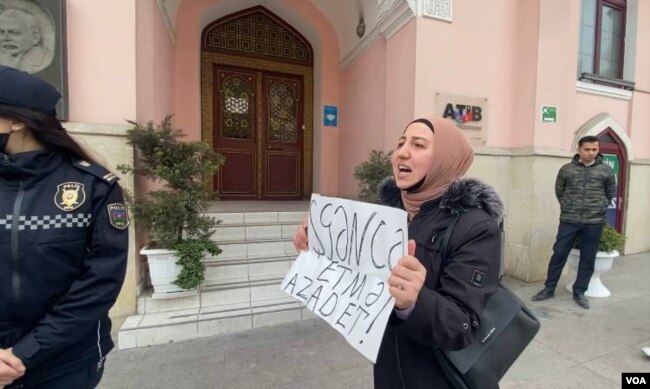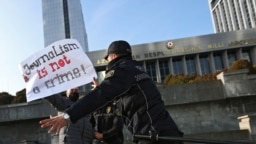April 30, 2023
Aziza Goyushzade
Parvana Bayramova

Gulmira Aslanova, pictured in Baku, Azerbaijan, doesn't believe that the trial of her husband, journalist Polad Aslanov, was conducted fairly. A lawyer for the journalist has filed a case on it with the European Court of Human Rights. (VOA)
BAKU, AZERBAIJAN —
Ten-year-old Fatima is counting the days until her father, Azerbaijani journalist Polad Aslanov, is released from prison.
Aslanov, the chief editor of the independent news websites Xeberman and Press-az, has been detained since his arrest in 2019. One year later, a court convicted him of treason and sentenced him to 16 years in prison.
The Supreme Court later reduced the sentence to 13 years, but his detention weighs heavily on the family.
His wife, Gulmira Aslanova, told VOA she hoped he might be released soon as part of an amnesty.
"As his wife and [on behalf of the] family, my demand is his freedom. My husband is innocent," Gulmira Aslanova told VOA. "I hope that this year my husband will attain his rightful freedom with a pardon and will be reunited with his young child."
Aslanova doesn't believe that her husband's trial was conducted fairly. A lawyer for the journalist has filed a case on it with the European Court of Human Rights.
Aslanov is one of several journalists and bloggers facing legal action. Data from December 2022 by the New York-based Committee to Protect Journalists showed two imprisoned in Azerbaijan for their journalism.
A more recent list of political prisoners, released on April 20 by two monitoring groups, shows that of the 182 political detainees they have documented as in custody, six are journalists or bloggers.
But arrests are not the only challenge for the country's media, experts say.
Rufat Safarov, executive director of the human rights organization Defense Line, said the country has many obstacles to freedom of speech and expression.
"In practice, forcing citizens to change their opinions and beliefs is widespread," Safarov told VOA. As a result of this, several journalists and bloggers "have been isolated from the society."
Some are in prison, others have trials pending.
Another obstacle is the media legislation, signed into law by President Ilham Aliyev in January 2022.
BAKU, AZERBAIJAN —
Ten-year-old Fatima is counting the days until her father, Azerbaijani journalist Polad Aslanov, is released from prison.
Aslanov, the chief editor of the independent news websites Xeberman and Press-az, has been detained since his arrest in 2019. One year later, a court convicted him of treason and sentenced him to 16 years in prison.
The Supreme Court later reduced the sentence to 13 years, but his detention weighs heavily on the family.
His wife, Gulmira Aslanova, told VOA she hoped he might be released soon as part of an amnesty.
"As his wife and [on behalf of the] family, my demand is his freedom. My husband is innocent," Gulmira Aslanova told VOA. "I hope that this year my husband will attain his rightful freedom with a pardon and will be reunited with his young child."
Aslanova doesn't believe that her husband's trial was conducted fairly. A lawyer for the journalist has filed a case on it with the European Court of Human Rights.
Aslanov is one of several journalists and bloggers facing legal action. Data from December 2022 by the New York-based Committee to Protect Journalists showed two imprisoned in Azerbaijan for their journalism.
A more recent list of political prisoners, released on April 20 by two monitoring groups, shows that of the 182 political detainees they have documented as in custody, six are journalists or bloggers.
But arrests are not the only challenge for the country's media, experts say.
Rufat Safarov, executive director of the human rights organization Defense Line, said the country has many obstacles to freedom of speech and expression.
"In practice, forcing citizens to change their opinions and beliefs is widespread," Safarov told VOA. As a result of this, several journalists and bloggers "have been isolated from the society."
Some are in prison, others have trials pending.
Another obstacle is the media legislation, signed into law by President Ilham Aliyev in January 2022.
The law’s regulations will further stifle the freedom of speech in the country, experts say. Independent journalists in Azerbaijan are protesting the law and calling for its repeal, saying it obstructs their ability to work and gives the government too much control over the media.
As part of the regulations, journalists must sign on to a registry. Without that accreditation, they are prevented from accessing officials or news briefings.
Safarov believes the law could pave way to more journalists and bloggers being detained if additional amendments are made to the law.
A joint opinion from the Council of Europe bodies, the Venice Commission and the Directorate General of Human Rights and Rule of Law said that "in the context of an already extremely confined space for independent journalism and media in Azerbaijan," the new law will have a "chilling effect."
"It is quite clear that some of the new provisions of the new media law do not comply with European standards of media freedom and journalistic freedom," said Mogens Jensen, general rapporteur on media freedom and safety of journalists of PACE, or the Parliamentary Assembly of the Council of Europe.

Gulmira Aslanova, whose husband, journalist Polad Aslanov, is serving 13 years in prison, holds a sign saying, "Don’t torture. Free," during a protest she held in front of the presidential administration building in Baku, Azerbaijan, April 8, 2022. (VOA)
Jensen said that they want Azerbaijan to revise the law using recommendations from the Venice Commission.
The U.S. State Department report on human rights in Azerbaijan noted that with the new law, the government has imposed further restrictions on journalists and "continued to routinely arrest independent journalists, especially those critical of government officials or investigating corruption."
Azerbaijan's government contends that it respects freedom of expression and the press, and that it is making sincere efforts to uphold these freedoms.
"As you know, censorship has been banned in the country for almost 30 years. There are numerous media institutions operating. We have always encouraged the activity of both internal and foreign institutions for more effective provision of media freedom," Bahruz Maharramov, a member of the Azeri parliament, told VOA.
He said that in the eyes of Western institutions, only media outlets that share the same Western values are considered independent.
"For some reason, media organizations that take a radical stance against the government are generally labeled as free, while media structures that are neutral or positive towards the current administration are branded as dependent media," he said.
In Aslanov's case, the journalist's wife told VOA she hoped that he would soon be freed and that their family life would return to normal.
"I can't imagine my family without Polad. He is my friend, my work and life partner. Soon I want to see my husband free next to me and doing his work."
Since his arrest, one of the two news websites that Aslanov ran had to close. Content is rarely posted to the other site, Aslanova said.
This story originated in VOA's Azeri Service.
Jensen said that they want Azerbaijan to revise the law using recommendations from the Venice Commission.
The U.S. State Department report on human rights in Azerbaijan noted that with the new law, the government has imposed further restrictions on journalists and "continued to routinely arrest independent journalists, especially those critical of government officials or investigating corruption."
Azerbaijan's government contends that it respects freedom of expression and the press, and that it is making sincere efforts to uphold these freedoms.
"As you know, censorship has been banned in the country for almost 30 years. There are numerous media institutions operating. We have always encouraged the activity of both internal and foreign institutions for more effective provision of media freedom," Bahruz Maharramov, a member of the Azeri parliament, told VOA.
He said that in the eyes of Western institutions, only media outlets that share the same Western values are considered independent.
"For some reason, media organizations that take a radical stance against the government are generally labeled as free, while media structures that are neutral or positive towards the current administration are branded as dependent media," he said.
In Aslanov's case, the journalist's wife told VOA she hoped that he would soon be freed and that their family life would return to normal.
"I can't imagine my family without Polad. He is my friend, my work and life partner. Soon I want to see my husband free next to me and doing his work."
Since his arrest, one of the two news websites that Aslanov ran had to close. Content is rarely posted to the other site, Aslanova said.
This story originated in VOA's Azeri Service.

No comments:
Post a Comment